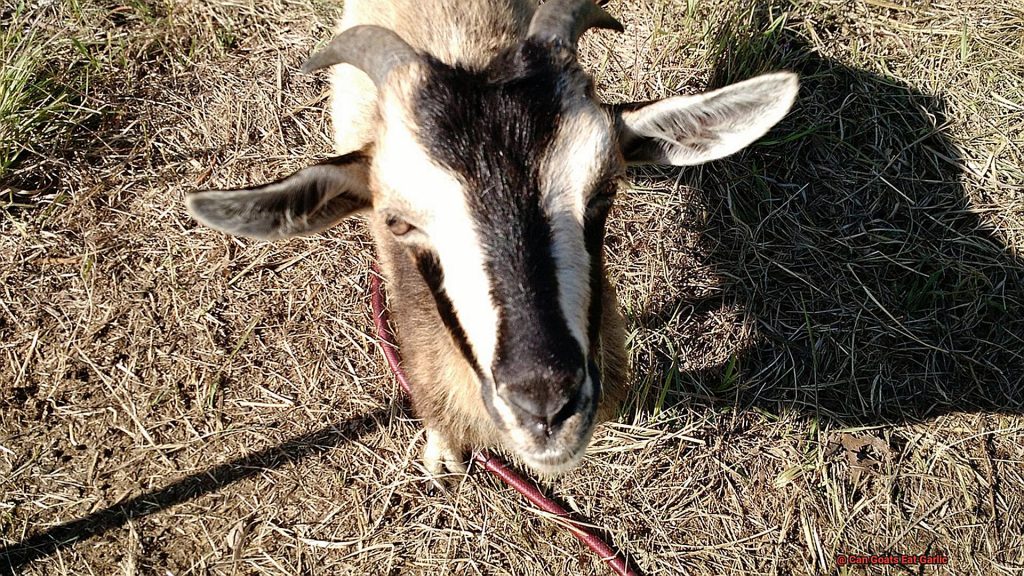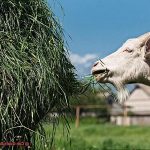For centuries, garlic has been used for its medicinal properties and to add flavor to food. But when it comes to feeding goats, many farmers and goat keepers are unsure whether it’s safe for their furry friends to consume this pungent bulb. Goats have a reputation for nibbling on anything they can find, but sometimes their curious behavior can lead to stomach upsets or even toxic reactions. That’s why it’s crucial to understand whether garlic is suitable for goats and how much they can safely eat.
Several factors come into play when deciding what foods are appropriate for goats, such as their age, size, and nutritional requirements. Garlic contains allicin, a compound that acts as a natural dewormer and offers potential health benefits for goats. However, too much garlic can be harmful if not given correctly or in excessive quantities. Moreover, some goats may turn up their noses at the taste of garlic altogether.
In this blog post, we’ll explore the topic of goats and garlic in-depth, examining the advantages and potential drawbacks of adding garlic to your goat’s diet. We’ll also discuss essential factors you need to consider before feeding your goat garlic and how to gauge whether they enjoy it or not. So if you’re wondering whether your goats can eat garlic safely, read on and discover everything you need to know.
What is Garlic?
Contents
Garlic is an amazing herb that has been used for centuries for its distinct flavor and numerous health benefits. This bulbous plant, scientifically known as Allium sativum in the onion family, is a popular ingredient in many cuisines worldwide.
The garlic plant can grow up to 2-3 feet tall and consists of several cloves that are covered by a papery skin. Each clove has a unique aroma and flavor that is heightened when crushed or minced. Garlic’s high content of allicin, a natural compound, gives it antibacterial, antifungal, and antiviral properties, making it a natural remedy for respiratory infections, high blood pressure, and digestive issues.
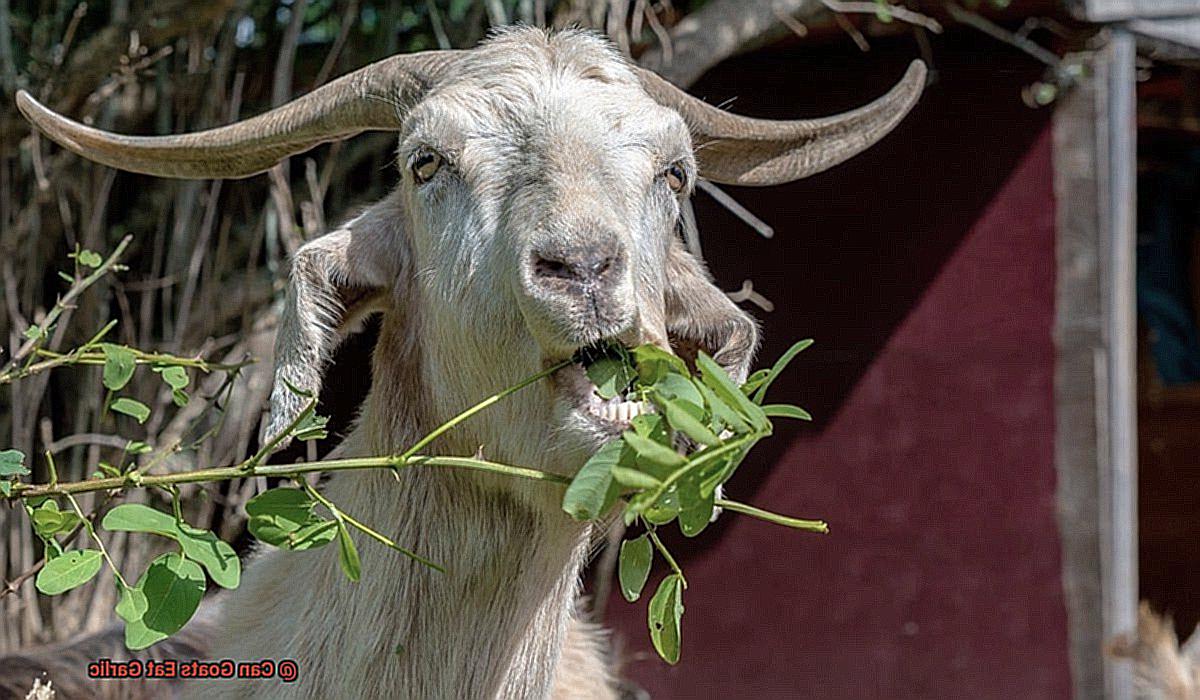
Garlic’s medicinal properties make it popular among health enthusiasts and livestock owners. However, excessive consumption of garlic can lead to anemia in goats because it can reduce the red blood cell count. Therefore, it’s best to consult with a veterinarian or animal nutritionist before adding any new food or supplement to your goat’s diet.
In addition to its medicinal benefits, garlic is a flavorful ingredient that adds depth to many dishes around the world. It’s often used in sauces, marinades, and dressings. Italian pasta dishes, French aioli sauce, and Indian curries are just a few examples of popular dishes that feature garlic.
Overall, garlic is a versatile herb with many benefits in both culinary and medicinal contexts. Its distinctive flavor and health advantages make it an excellent choice for cooks and health enthusiasts alike.
Benefits of Garlic for Goats
Look no further than garlic. This versatile herb has been used for centuries for its medicinal properties and can provide several benefits to your goats.
One of the most significant benefits of garlic for goats is its ability to boost their immune system. Garlic contains allicin, a compound with antibacterial, antiviral, and antifungal properties. These properties help goats fight off infections and diseases, making them less susceptible to illnesses.
But that’s not all. Garlic is also an excellent source of antioxidants, which are essential for maintaining good health. Antioxidants help to neutralize free radicals that can cause cell damage and lead to diseases such as cancer. By adding garlic to your goat’s diet, you can help keep them healthy and prevent various illnesses.
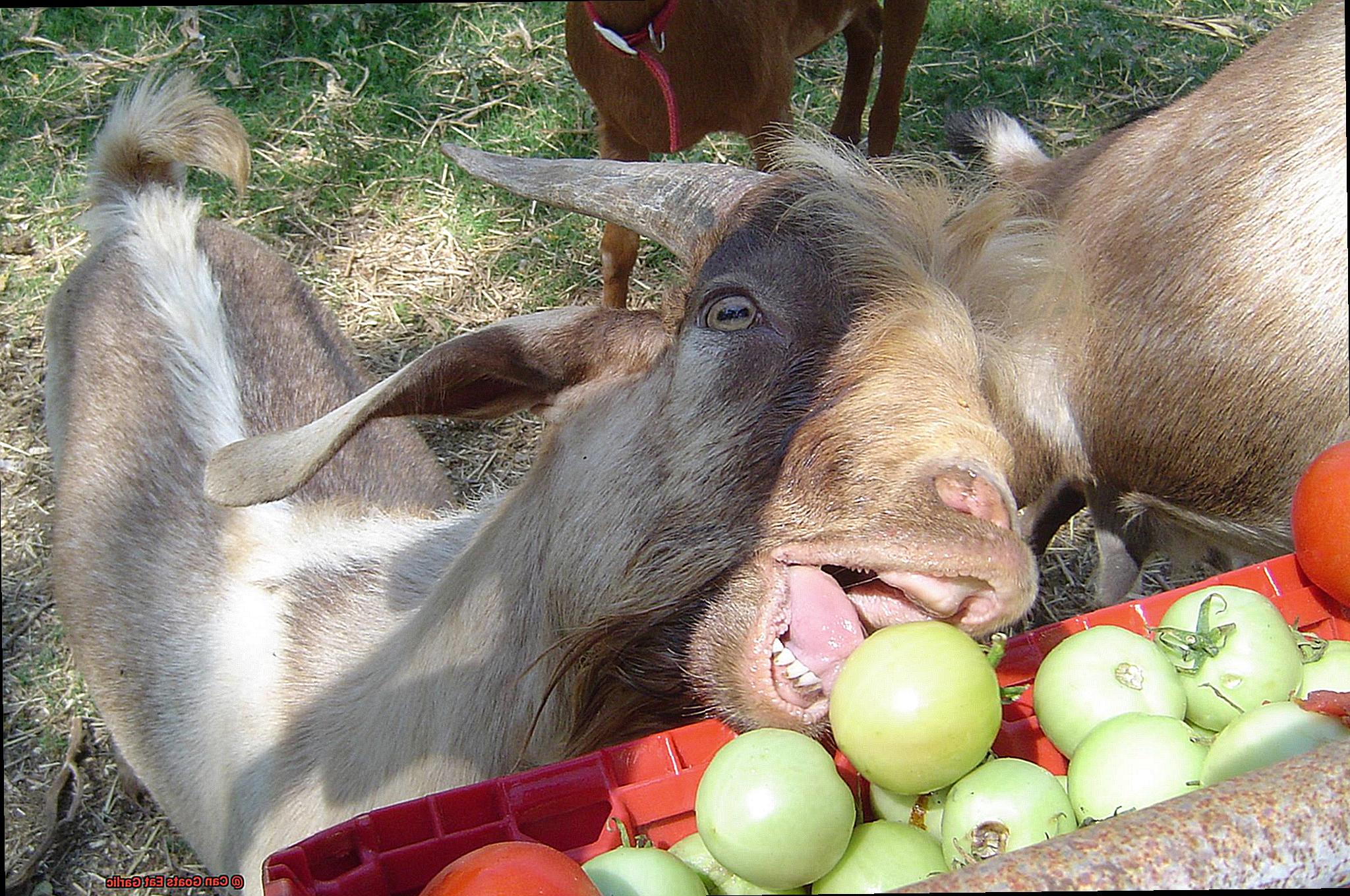
Garlic’s benefits don’t stop there. It can also improve your goat’s digestive system by stimulating the production of digestive enzymes with its sulfur compounds. This promotes better digestion and absorption of nutrients, helping prevent digestive problems such as bloating, constipation, and diarrhea.
And if that wasn’t enough, garlic can even act as a natural insect repellent for goats. The strong odor of garlic can repel pests such as ticks, fleas, and flies, reducing the risk of infestations and infections.
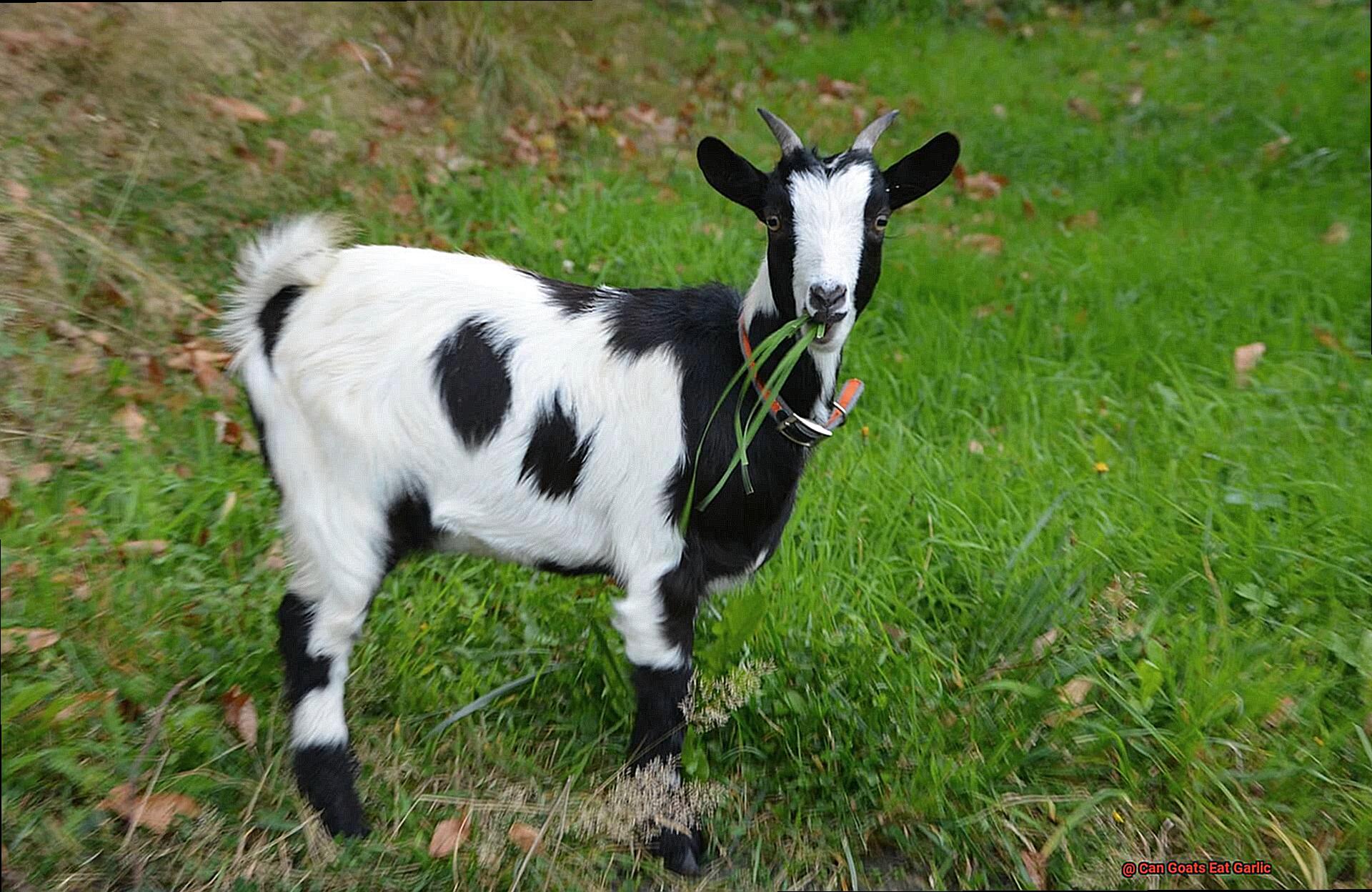
However, it’s crucial to note that feeding your goats excessive amounts of garlic can be harmful and may lead to digestive issues. Therefore, it’s important to consult with a veterinarian before adding garlic to your goat’s diet.
Potential Risks of Feeding Garlic to Goats
That’s why it’s essential to be aware of the potential risks that come with feeding garlic to goats. While garlic is safe and even beneficial for humans, it can be detrimental to goats when consumed in large quantities or over an extended period.
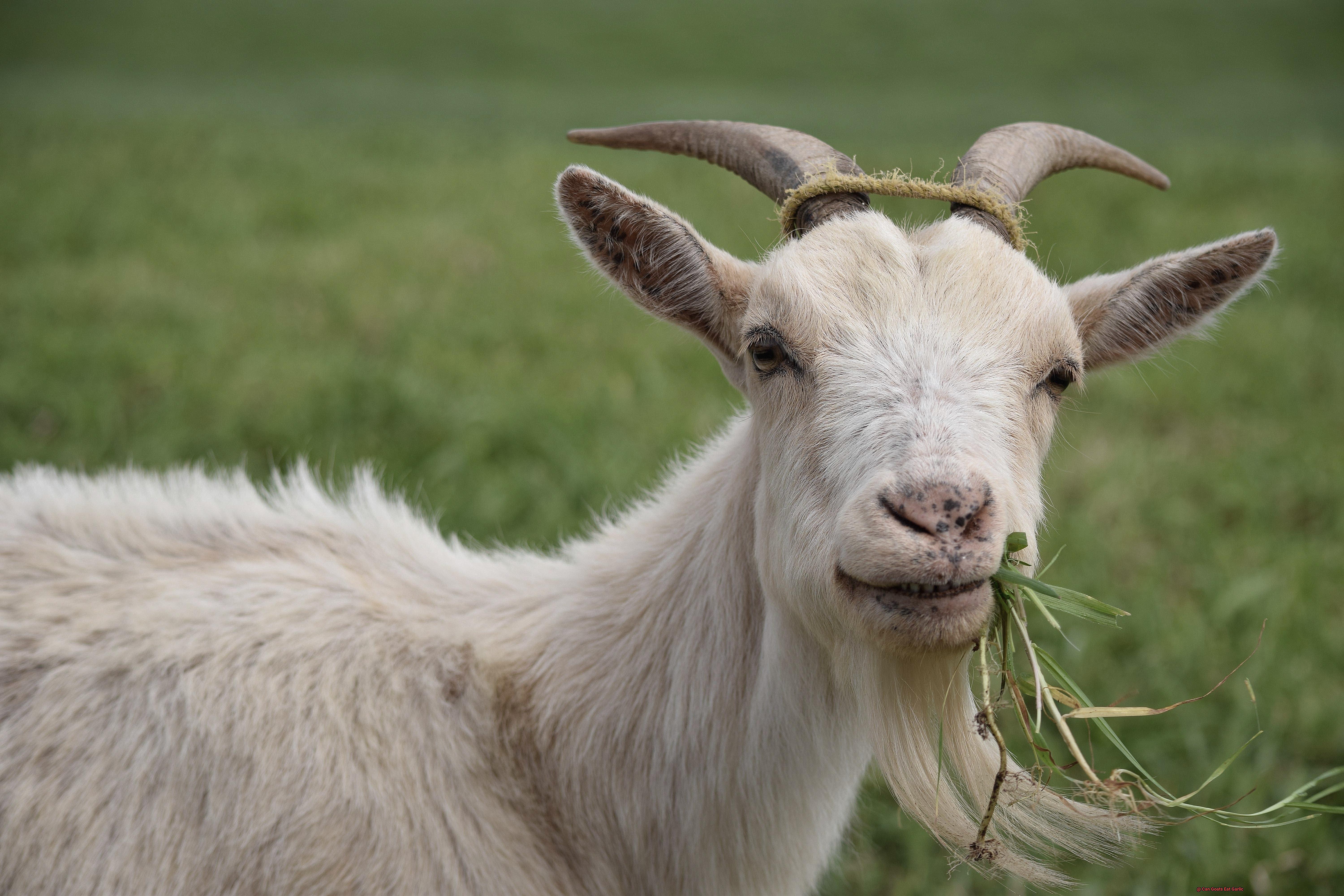
The most significant risk of feeding garlic to goats is the development of Heinz body anemia. Garlic contains thiosulphates that can rupture and break down red blood cells, leading to a decrease in functional red blood cells and ultimately causing anemia. This condition can be fatal.
Feeding garlic to goats can also cause digestive issues such as bloating and diarrhea, which can disrupt their delicate digestive systems. Additionally, it weakens their immune system, making them more susceptible to secondary bacterial infections, especially when their immune system is already compromised due to anemia or digestive issues.
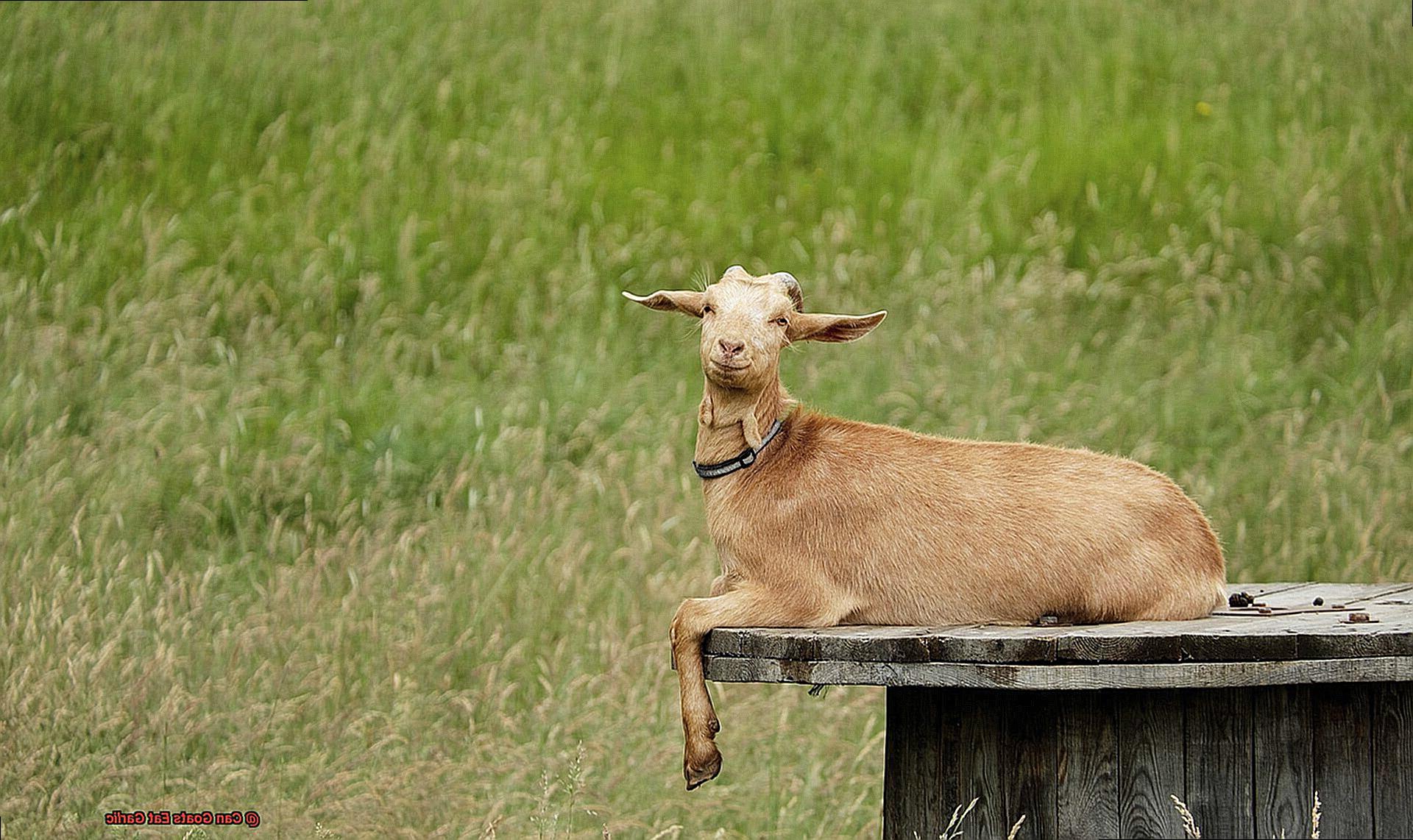
While not all goats will experience adverse effects from consuming garlic, it’s crucial to limit their intake or avoid feeding it altogether. If you decide to feed garlic to your goats, start with small quantities and monitor them closely for any signs of adverse reactions.
Factors That Affect the Amount of Garlic to Feed Goats
Garlic is a great option, but it’s important to understand the factors that affect the amount of garlic that should be given to goats.
Firstly, age and weight are the two key factors to consider. Younger goats or kids may not be able to tolerate as much garlic as adult goats due to their developing digestive systems. Similarly, smaller goats may require less garlic compared to larger ones as they have a smaller body mass to metabolize it. So, make sure to adjust the amount of garlic according to your goat’s age and weight.
Secondly, the purpose of feeding garlic to your goats should also be taken into consideration. Garlic has antibacterial and antiviral properties, making it an effective way to prevent illnesses in goats. However, if you are giving garlic for flavoring or as a supplement, a smaller amount may suffice. Therefore, it’s important to understand why you are feeding garlic to your goats before determining the appropriate amount.
Lastly, the overall health of your goat plays a crucial role in determining how much garlic should be given. If your goat is already suffering from an illness or has a weakened immune system, feeding them with too much garlic may do more harm than good. It’s always best to consult with a veterinarian before making changes to your goat’s diet.
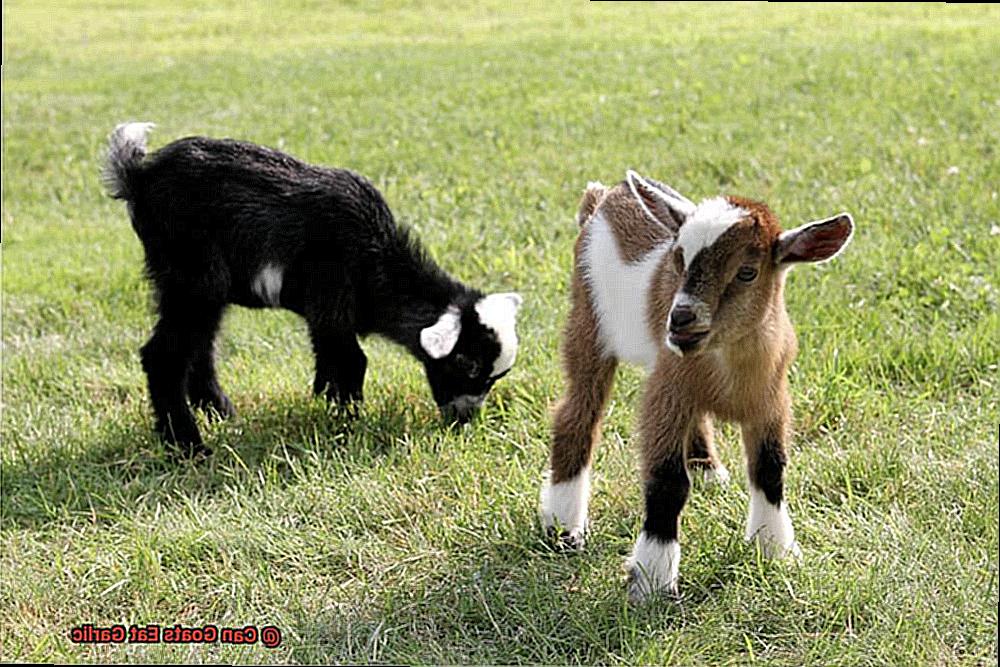
While garlic can provide numerous health benefits for your goats, too much can be harmful and potentially toxic. So, carefully monitor the amount of garlic given to your goats based on their age and weight, the purpose of feeding garlic, and their overall health.
When to Avoid Feeding Goats Garlic
Although garlic can provide numerous health benefits, it’s vital to know when to avoid feeding it to your goats.
One of the biggest risks of feeding garlic to goats is that it can cause a reduction in red blood cells, which can be fatal if left untreated. This is especially true if the goats consume too much garlic or if it’s fed over an extended period of time. Therefore, it’s best to avoid feeding garlic to goats, especially if they have underlying health issues that may exacerbate the problem.
Another reason to avoid feeding goats garlic is that it can lead to digestive upset. Garlic is known to be a potent digestive stimulant, and in some cases, it can cause diarrhea or other gastrointestinal problems in goats. Moreover, if a goat has a pre-existing digestive condition like acidosis, feeding them garlic can worsen the problem and lead to significant health issues.
It’s also worth noting that some goats may not enjoy the taste of garlic. While most goats are curious and willing to try new foods, some may be more selective eaters than others. If your goat doesn’t seem interested in garlic, there’s no need to force-feed them.
In conclusion, while there are benefits to incorporating garlic into a goat’s diet, it’s essential to be mindful of the potential risks and take steps to minimize them whenever possible. As an expert on feeding goats, I highly recommend avoiding feeding garlic to your goats unless under the guidance of a veterinarian or experienced goat owner.
How to Feed Garlic to Goats Safely
Garlic is a powerhouse ingredient that has been used for centuries for its medicinal properties, and it’s also a staple in many kitchens around the world. However, when it comes to feeding garlic to your goats, there are some critical safety considerations to keep in mind. In this blog post, we’ll explore five essential subtopics on how to safely feed garlic to goats.
Benefits of Garlic for Goats
Garlic is an excellent source of nutrients, such as vitamins B6 and C, and minerals like calcium and potassium. Moreover, garlic contains compounds such as allicin that have antibacterial, antifungal, and antiviral properties. These properties make garlic a natural remedy for various health issues in both humans and animals. Additionally, garlic has been used as an appetite stimulant for livestock, including goats. It can also act as a natural dewormer and boost the immune system of your goats.
Moderation is Key
Feeding garlic to your goats in moderation is crucial. While garlic has many health benefits for goats, it can also be toxic if given in large quantities. Therefore, it is vital to know how much garlic to feed your goats. Starting with small amounts of garlic and gradually increasing the dosage over time is recommended. This will give the goat’s digestive system time to adjust and reduce the risk of any adverse reactions.
Use Fresh Garlic
It is always best to use fresh garlic instead of dried or powdered garlic when feeding your goats. This is because fresh garlic retains more of its medicinal properties and is less likely to be contaminated with harmful additives.
How to Feed Garlic to Goats
One popular method of feeding garlic to goats is to mix chopped or crushed garlic cloves into their feed. As a general rule of thumb, start with 1-2 cloves per day for adult goats and half a clove for younger goats. As the goats become accustomed to the garlic, the dosage can be gradually increased up to a maximum of 3-4 cloves per day for adults. Additionally, you can make a garlic tincture by steeping chopped garlic cloves in water or apple cider vinegar for several weeks. This can then be added to the goat’s drinking water or feed in small amounts.
Monitor Your Goats Closely
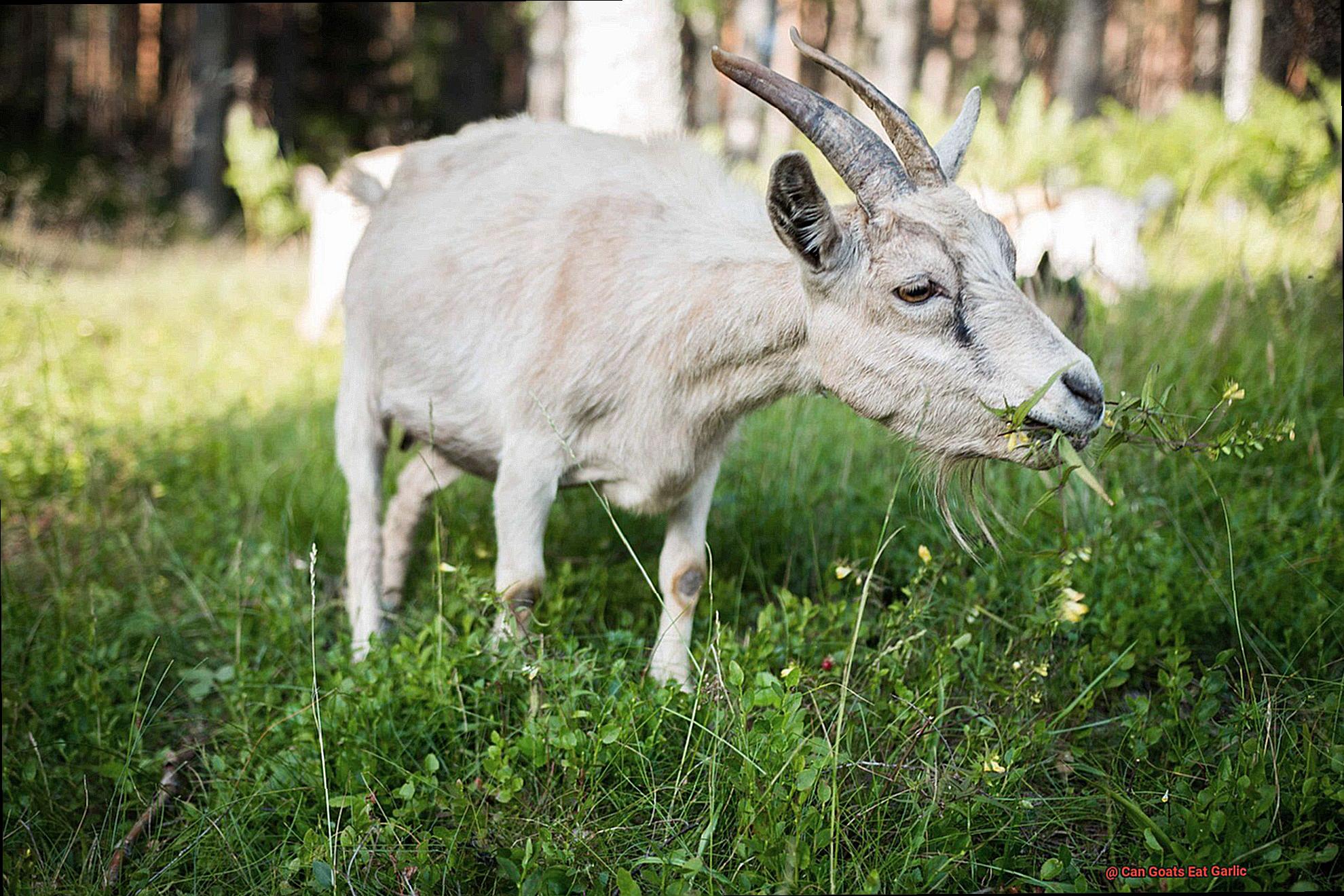
It’s important to monitor your goats closely when feeding them garlic and look out for any signs of digestive issues or adverse reactions. If any adverse reactions occur, stop feeding them garlic immediately and seek veterinary advice.
In conclusion, feeding garlic to your goats can have many benefits if done safely and in moderation. By following these guidelines, you can safely feed garlic to your goats and enjoy its many health benefits without putting their health at risk. Always consult with a veterinarian before introducing any new foods or supplements into your goat’s diet.
Different Ways to Incorporate Garlic Into a Goat’s Diet
Garlic might be just what you need. Not only is garlic delicious and flavorful, but it also has numerous health benefits for goats. Here are eight different ways to easily incorporate garlic into your goat’s diet:
- Fresh Garlic – The most straightforward way to incorporate garlic into your goat’s diet is to feed them fresh garlic. You can crush or chop it up and mix it with their feed.
- Garlic Powder – Another option is garlic powder, which can be easily sprinkled over their food. This option also allows for easy dosing, making it a great choice for those just starting out.
- Garlic Oil – Garlic oil is a concentrated form of garlic that can be added to their feed or water. However, it should be used in moderation as it can cause some stomach upset.
- Garlic Juice – Fresh garlic juice can be mixed with water and given to your goats as a supplement. It’s a great option for those looking for a more concentrated dose of garlic.
- Garlic Capsules – If you don’t want to deal with the messiness of fresh garlic or garlic powder, you can opt for garlic capsules that can be easily added to their feed. These capsules typically come in standardized doses, making it easy to know how much you’re giving your goat.
- Garlic Fermented Water – Garlic fermented water is a popular option amongst goat owners as it is an easy and effective way to incorporate garlic into their diet. Simply soak a few cloves of garlic in water for a few days, strain out the garlic, and give the water to your goats.
- Garlic Salt Lick – A garlic salt lick is another option to consider. It not only provides your goats with a source of essential minerals but also adds the benefits of garlic to their diet.
- Garlic Extract – Garlic extract can be purchased at most health food stores and added to your goat’s food or water as a supplement. However, it should be used in moderation as it is highly concentrated.
Incorporating garlic into your goat’s diet can provide numerous health benefits such as improved digestion, immune system support, and parasite prevention. However, it’s important to start with small amounts and gradually increase the dosage over time. Also, consult with your veterinarian before making any significant changes to your goat’s diet.
Overall, incorporating garlic into your goat’s diet can be an effective way to boost their health and well-being. Whichever method you choose, make sure to do so responsibly and with care.
uIzj-_w43pM” >
Conclusion
To wrap it up, we’ve discovered that goats can indeed eat garlic. This herb has been a go-to for centuries, known for its unique taste and health advantages. For goats, garlic can work wonders by boosting their immune system, aiding digestion, and acting as a natural repellent against pesky insects. However, it’s important to remember that too much of a good thing can be harmful.
When deciding how much garlic to feed your goat, take into account factors such as age, weight, and overall health. Keep an eye out for any negative reactions or digestive problems as well.
You have plenty of options when it comes to incorporating garlic into your goat’s diet – fresh garlic cloves, powdered garlic, garlic oil, and even a salt lick infused with the herb. Whichever method you choose to use, always practice responsible feeding habits and proceed with caution.
In summary, while feeding your goats garlic can be beneficial in moderation and done safely, consulting with an animal nutritionist or veterinarian is always recommended before introducing any new food or supplement into your goat’s diet.

